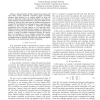Free Online Productivity Tools
i2Speak
i2Symbol
i2OCR
iTex2Img
iWeb2Print
iWeb2Shot
i2Type
iPdf2Split
iPdf2Merge
i2Bopomofo
i2Arabic
i2Style
i2Image
i2PDF
iLatex2Rtf
Sci2ools
109
click to vote
GLOBECOM
2008
IEEE
2008
IEEE
On Base Station Cooperation Schemes for Downlink Network MIMO under a Constrained Backhaul
— Next generation mobile comunications systems will most likely employ multi-cell cooperative signal processing schemes, often referred to as network MIMO, as these are known to effectively combat inter-cell interference and improve system fairness and spectral efficiency. A major downside of such schemes is, however, the large extent of backhaul infrastructure required for the information exchange between cooperating base stations. In this paper, we observe a cooperative downlink transmission from two base stations to two terminals under different extents of available backhaul capacity. We adapt some well-known concepts from the Gaussian interference channel and observe a variety of possible cooperation schemes. We observe that it is beneficial to use an adaptive cooperation concept, where the base stations exchange either the data to be jointly transmitted itself or partially precoded and compressed signals, depending on the instantaneous channel realization.
Base Stations | GLOBECOM 2008 | Possible Cooperation Schemes | Signal Processing Schemes | Telecommunications |
Related Content
| Added | 29 May 2010 |
| Updated | 29 May 2010 |
| Type | Conference |
| Year | 2008 |
| Where | GLOBECOM |
| Authors | Patrick Marsch, Gerhard Fettweis |
Comments (0)

